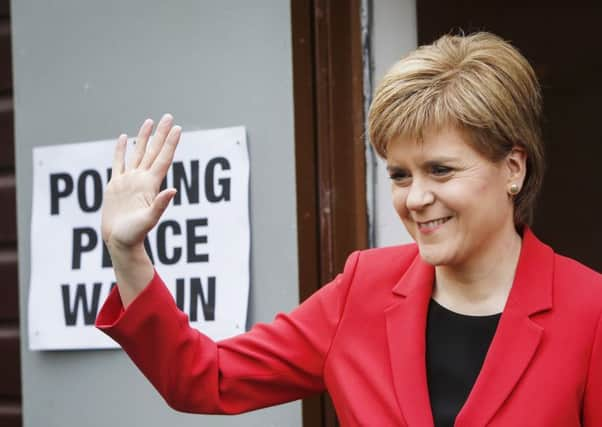Leaders: Sturgeon's '˜neverendum' stance hitting business


Of the many uncertainties facing Scottish business, arguably the greatest are not those flowing directly from the UK vote to leave the EU but the repeated desire of First Minister Nicola Sturgeon to hold a second independence referendum – and to do so soon.
This posture cannot but reignite the concerns faced by businesses in the course of the long independence battle of 2014. Of particular concern was the impact on Scotland’s financial sector and whether its leading financial institutions, including the banks, would remain domiciled here. The widespread fear was that customers would vote with their feet and move their business to those companies that were legally domiciled – or soon to be domiciled – south of the border.
Advertisement
Hide AdAdvertisement
Hide AdIn the event, not only was there relief across the sector that Scottish voters chose to reject independence, but comfort was also drawn from assurances by SNP leaders that the result would be accepted and the issue was as good as settled for a generation.
Now nothing looks settled at all. With the assertion by the SNP that a UK-wide vote to leave the EU changes everything and that a rerun of the independence referendum is now justified, Scottish businesses are once again faced with deep uncertainty over the future of the legal jurisdiction they may be operating under – what the official currency might be and the tax rates and levels that might apply in the event that Scots vote for independence.
Ross McEwan, chief executive of RBS, says the group could still move its headquarters out of Scotland if there is a Yes vote in a second referendum. The vote to leave the EU, he declared, has not changed the bank’s position in 2014 that it might have to move out of Scotland in the event of independence.
Miss Sturgeon has pledged to explore all options to keep Scotland in the EU, and said a second independence referendum is “highly likely”. While there are clear indications that voter fatigue has set in and that there is little enthusiasm outside the ranks of the SNP for an early referendum, the very fact that it is being talked about at the highest levels of the Scottish administration is itself creating uncertainty. That cannot be at all helpful for a business community which has more than enough to worry about with the loss of growth momentum across the economy.
The SNP administration itself has much to contend with on this front. Only last week it announced a £100 million funding package to help bring forward infrastructure projects and create new jobs.
But the economy is more than a programme of council road repairs and public works. It requires tens of thousands of private businesses to be sufficiently confident of prospects to undertake spending for future investment and expansion.
A Scotland trapped in a constant ‘neverendum’ will struggle to create a forward-looking and prosperous economy. The First Minister must be advised to appreciate more than she evidently does that constant calls for another referendum are exacting a costly price.
Olympic moments to be cherished
Even setting aside the near hysterics of sports commentators, our achievements in the Olympic Games with still a week to go have been admirable.
Advertisement
Hide AdAdvertisement
Hide AdThe sight of Mo Farrah winning a historic third gold medal despite being knocked over in the 10,000 metres is a performance which should inspire a generation.
He is the first British track and field athlete to secure three Olympic titles. Together with Laura Trott, who also made history by claiming her third Olympic gold medal, the Great Britain and Northern Ireland secured eight medals on day eight of the Rio Games.
Scottish Olympians in Rio meanwhile are already celebrating our best ever medal haul from an overseas Games.
Not only does this follow on the heels of stunning success in the London 2012 Olympics, but it is also the breadth of the success that is truly impressive. All this places “Team GB” a firm third in the medals tally, above Germany, Japan, Italy, Russia and Australia. Not all that long ago it seemed Britain was forever condemned to be an Olympic also ran, a polite and diffident nation of competitors but with a low medal tally. Few expected anything better. Now all that has changed, with intense training, greater professionalism and better resources. Much of the credit for this is due to behind the scenes heroes including teachers, coaches and trainers.
The exploits of our home grown stars in all manner of sports– from cycling sensation Callum Skinner to Wimbledon tennis champion Andy Murray and others – should be celebrated in every classroom and PE lesson as the schools go back this week.